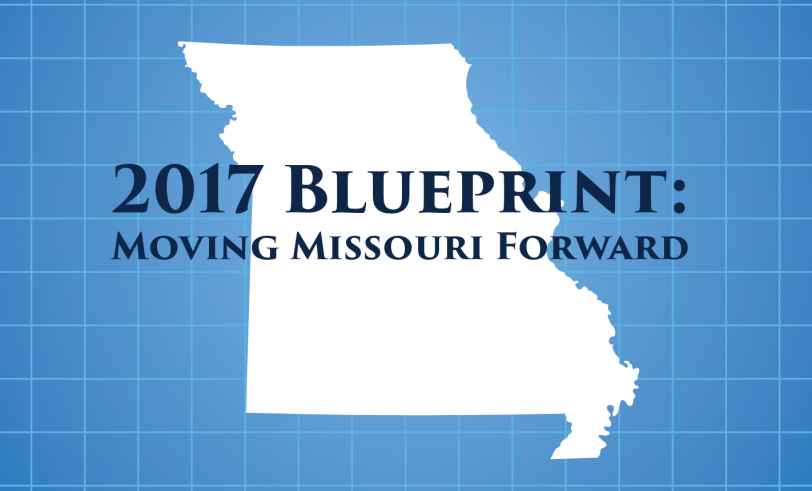2017 Blueprint: Moving Missouri Forward

The 2017 Blueprint: Moving Missouri Forward presents 15 policy ideas covering a broad ranges of issues – from education to healthcare, from public pensions to union reform, and from tax policy to transportation. Together, these policies can move Missouri forward to a brighter future.
Certificate of Need: Missouri’s Certificate of Need (CON) law restricts health care competition by requiring health care providers to get state approval before entering new markets or expanding services offered in existing facilities. This restriction hampers innovative start-ups and market newcomers that would provide Missourians care and puts upward pressure on healthcare prices. Read more about certificate of need.
Charter Schools: Demand for charter schools in Missouri is at an all-time high. Unfortunately, charter schools are functionally limited to the Kansas City and Saint Louis School Districts. Tens of thousands of students are denied the opportunity for a better education. Read more about charter schools.
Course Access: All across Missouri, students do not have access to higher-level coursework such as AP courses, calculus, or physics. Read more about expanding course access.
Earned Income Tax Credit: State spending is on the rise in Missouri, led by a growth in public welfare dollars. Public welfare spending now accounts for more than 26% of total spending and 34% of spending growth. The growth in public welfare shares of total spending has eclipsed the growth of all other general expenditure functions. Read more about earned income tax credits.
Economic Development: Excessive use of economic development subsidies has hollowed out municipal tax bases and diverted tax revenue to specific developers. In the past 15 years, Saint Louis City alone has allocated $709 million away from municipal services through tax increment financing (TIF) and tax abatement. Studies from across the country indicate that these subsidies fail to generate promised jobs and growth. Read more about reforming economic development.
Education Savings Accounts (ESAs): Missouri students are underperforming. On the 2015 NAEP exam, only 31 percent of Missouri 8th-graders were found proficient in Math and only 36 percent were found proficient in English. For the Class of 2016, only 22 percent of Missouri ACT test-takers scored “college-ready” in all four tested subjects. Many students are trapped in failing schools via residential assignment and have no opportunity to pursue a better education. Read about introducing ESAs in Missouri.
Higher Education: The University of Missouri system, and higher education in the United States in general, are at a crossroads. Tuition is rising, resulting in over $1 trillion in student loan debt nationwide. At the same time, students who fail to secure a high-income job face serious financial consequences. As schools struggle with this, a rising tide of anti–free speech policy is sweeping across the higher education landscape. Read about reforming higher education.
Individual Income Tax Reform: Missouri’s economy has been stalled for almost two decades, as startup growth has slowed and entrepreneurs and taxpayers are leaving the state. Missouri is shrinking relative to other states and economies, ranking 48th out of 50 states in real GDP growth between 1997 and 2015. Individual income taxes are destructive to the state’s economic growth, productivity, and income, encouraging taxpayers to move their work or investments out of Missouri. This not only lowers economic output for the state, but also destabilizes revenue for state and local governments. Read more about reforming the individual income tax.
Open Collective Bargaining: Under current Sunshine Law in Missouri, government bodies may close meetings, records, and votes relating to contract negotiations until the contract is executed or rejected. This lack of transparency in negotiations between government unions and government officials can lead to contractual agreements that aren’t in the public’s best interest. Read more about open collective bargaining.
Prevailing Wage and Project Labor Agreements: State law governs what many government contractors must pay workers to get a government project, and it can also govern what kinds of workers contractors can use on that job. These restrictions often mean that large union contractors from big cities get jobs, to the detriment of smaller companies, local laborers, minority laborers, and taxpayers. Read more about prevailing wage and project labor agreements.
Public Pension Reform: Defined benefit (DB) pension plans promise employees annual payments for life upon retirement, but if a public plan does not have enough money to make these payments, taxpayers are legally bound to fund the difference. Pension plans can come up short if they fail to make sufficient contributions or overestimate their investment returns. Nationwide, state and local public pension funds are underfunded by more than $1 trillion dollars. Read about public pension reform.
Public Union Recertification: Once a government union comes to power, it can stay in power indefinitely. No further elections are scheduled and no term limits are imposed. This means workers can do little to ensure their union truly represents their interests and is held accountable. Read about public union recertification.
Right to Work: Many workers in Missouri can be forced to join unions. That is unfair not only to the employees disempowered by the law, but also to employers who have to operate under it. Read more about introducing right to work in Missouri. Governor Eric Greitens signed right to work legislation into law on February 6, 2017.
Tax Credit Reform: The state of Missouri uses public money to subsidize the private projects of special interests, often in the name of “economic development.” Practically, that means less money for public needs and greater difficulty in later reducing taxes for all taxpayers. Read about reforming tax credits.
Transportation: The Missouri Department of Transportation (MoDOT) will likely face funding shortfalls in the near future. The state will need to generate new revenue in fair and economically sound ways. Read more about Missouri’s transportation infrastructure.


